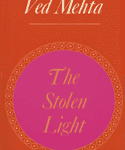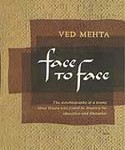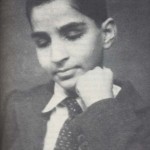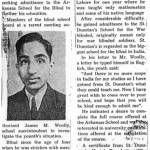Sight Unseen
“Deprivation often makes a writer,” says Ved Mehta, whose serial autobiography charts his rise from a sometimes brutal childhood in British India, bereft of education, to his long-standing presence on the New York literary scene since the early 1960s.
As a staff writer of The New Yorker for 33 years – until he became a casualty in 1994 of Tina Brown, who had become its editor in 1992 – most of his 23 books first appeared in serial form in the magazine, alongside such authors as John Updike, J.D. Salinger and James Baldwin. The late editor-in-chief William Shawn saw Mehta, his protege, as one of The New Yorker’s “most imposing figures,” whose “prose style – airy, elegant, marvellously clear – is his signature.”
Mehta has a further distinction, having lost his sight through meningitis before his fourth birthday. His debut memoir, Face to Face (1957), published when he was 23, testified to astonishing bravery and tenacity. His subsequent nine-volume autobiography, Continents of Exile, was written over 30 years between other books on history and ideas in India and the west.
For the writer Peter Ackroyd, Mehta records his life “as if his fall into blindness had broken open his perception so that nothing escapes him,” producing a “clarity that is sometimes like clairvoyance.” Yet it is precisely that clairvoyance that has irked some readers, who accuse Mehta of dishonesty, even fraudulence, in writing as though he could see. His work contains lavish visual imagery: in a 1962 New Yorker profile, he described the novelist R.K. Narayan as having “impish and mischievous” eyes. A New York Times review of Walking the Indian Streets (1960) complained that Mehta “fooled” and played an “extraordinary trick” on his readers, in which the publishers colluded by omitting mention of his blindness from the jacket blurb.
Literary precedents among the blind are rife, from the possibly blind Homer to Milton, late Joyce and Borges. Yet one objection is that, but for a novel and some stories, Mehta does not write fiction: his books describe the real world. Mehta, however, not only appears to write as though he can see; he has lived that way too. He famously makes his way through city streets with neither white cane nor guide dog (“I’d rather be run over than carry a white stick”). He loathes “meddlesome boy scouts,” and ascribes his independence to “facial vision,” sensing objects and terrain though “sound shadows” and the feel of the air. He has revolted against myths of the blind as heroic or pathetic, mendicants or seers – views distorted by what he calls people’s “elemental fear” of losing their sight.
While the writer and folk singer Shusha Guppy, who met Mehta in the 1950s, thought him “wonderful and brave,” others have suspected he must have partial vision. Mehta says he was once challenged to a boxing match by Norman Mailer, who said he was an impostor “faking being blind.” Yet his independence has come at the cost of serious knocks and falls. “He can be extraordinarily stoical about pain,” says Jasper Griffin, professor of classical literature at Oxford and a fellow undergraduate at Balliol in the 1950s. “He has a very strong will.”
In a New York heat wave, Mehta moves slowly but assuredly around his apartment on Manhattan’s Upper East Side, adjusting windows, making coffee or pouring wine. “I live and conduct my life as sighted people would have me do because I live among them,” he insists. He has a penchant for Savile Row tailoring, and his home, which he shares with his wife, Linn, and two daughters, Sage, 16, and Natasha, 14, attests to his own taste in antiques, Indian miniatures and modern art. For Americans, his soft eloquence evokes Oxford, yet his accent bears traces of all three continents he has traversed.
The ninth volume of Continents of Exile, published in Britain next week, sees Mehta, now 67, at his most confessional. All for Love: A Personal History of Desire and Disappointment, set in the 1960s and 70s as he launched his career at The New Yorker, reveals an anguish of loneliness. It is, he writes, a “record of my desperate quest for love,” and details his psychoanalysis after romances with four beautiful and capricious women, all of whom abandoned him. “If I’d avoided that area of my life, the autobiography would have suffered,” he says. “I’d have felt I had come to a certain point and drawn back.”
Mehta believes he was suffering from a delusion. “I lived in the grip of a fantasy that I could see…I went overboard, I allowed the fantasy to pervade every part of my life – the way I dressed myself, wrote books and articles, collected antique furniture and modern paintings.” He says: “In my case, because of wilfulness or defiance, the fantasy developed to an extraordinary degree. It served me terribly well professionally – I couldn’t have functioned as a journalist or writer without it. But it’s clear to me in retrospect that it played havoc with my private life.”
He traces that fantasy to his mother’s influence. He was born in 1934 in Lahore, in undivided India, the youngest of five children in a well-to-do Hindu family. When, aged three, his optic nerves were irreparably damaged by cerebrospinal meningitis, his mother, Shanti, “simply never accepted that I couldn’t see,” he says. “She’d hold up her hand and, because of facial vision, I could sense it. She confused that with my vision coming back. So the fantasy became implanted in me.” The uneducated daughter of a high court lawyer, his mother was also “extremely superstitious,” and took her son to “all kinds of charlatans and quacks, doctors of Ayurvedic medicine,” who advised her to flog him – to atone for sins committed in a previous incarnation, for which blindness was divine punishment. Though Mehta was “exasperated”, he looks back with “amusement and charity: my mother had a medieval outlook and believed in miracles; she didn’t know what an optic nerve was.”
By contrast, his father, Amolak Ram, was a London-educated doctor and public health official, and an “irrepressible optimist.” He rejected views prevalent in India, as in pre-Enlightenment Europe, that the blind were ineducable and condemned to be beggars or basket-weavers, but still saw his son’s future as limited. “I was brought up to think that the only way I could earn my keep was to perform Indian music or run a shop selling Indian instruments,” says Mehta, who worshipped his father, a gambler. “During the Raj he spent his evenings at the club playing poker ’til 3am. I grew up with a hunger for him, with the result that later in life I made my tutors into my father, and William Shawn into my father.”
Dr. Mehta discovered there were few schools for the blind in British India, since in the 19th century Lord Dalhousie had closed thousands of Hindu and Muslim charities. So, aged five, Ved was sent away to an American mission school for the blind in Bombay. It was more an “orphanage-cum-asylum,” and while there he was beset by diseases – a period described in Vedi(1982). “It was a huge, painful shock,” he recalls. He returned home after three years.
Mehta was left with a lifelong guilt. “Most of my years in New York, I lived well but in a small apartment,” he says. “I was always afraid of tempting the gods.” Yet he also gained a deeper sympathy. “Most people write about the poor as a sociological phenomenon. But I still dream about people having to go barefoot. I’ve always been more drawn to the poor in India – servants, scooter wallahs – than the well-to-do. I may get impatient at the flies and the stench, but I see more humanity in them.” His novel, Delinquent Chacha (1976), and its spinoff BBC documentary, “Chachaji: My Poor Relation,” were inspired by a poor uncle.
“Any kind of disadvantage makes you sympathetic to other kinds; poverty is, above all, a major handicap,” says Amartya Sen, the master of Trinity College, Cambridge – whom Mehta recalled in Up At Oxford (1993) as his victorious rival in love. Sen, who became his friend, admires Mehta as a “very systematic contemporary historian.”
As a child, Mehta imagined his sightless world was the same as everyone else’s; he learned to ride a bicycle and rollerskate, and ran perilously over rooftops flying kites, using his “facial vision.” But, kept at home until he was 15, he felt he was falling behind his siblings at school. “It must have developed my competitive spirit to an extraordinary degree,” he says. “That determination has stayed with me.” Although Mehta was “treated more like a girl, a burden, for whom a dowry had to be found to get me settled in a shop,” he professes a “complete inner confidence.”
At partition in 1947, when Ved was 13, his family were among millions of Hindu refugees who crossed the border from newly created Pakistan into India “with the clothes on our backs,” an era captured in The Ledge Between the Streams (1984) – which R.K. Narayan called a “masterpiece.” Mehta learned to type at an institute for Indian soldiers blinded in the second world war, and in 1949, aged 15, was admitted to the Arkansas School for the Blind in Little Rock – the setting of Sound Shadows of the New World (1986). As the first blind Indian boy to go to America, he was given a sendoff by Nehru.
Arkansas, he told the prime minister, was the only school that would have him; his mother tongue was Punjabi, and he spoke hardly any English – his fourth language. There he did 12 years’ schooling in three, but threw away his new white cane (“I don’t want anything to mark me out as different, abnormal”) and hitchhiked across the U.S.
He remained a lone exotic, the first Indian at Pomona College in southern California – the setting of The Stolen Light (1989) – where he got top marks. He wrote Face to Face aged 20, “out of a deep loneliness. In those days, if you couldn’t drive a car, you couldn’t get a date.” Mehta went on to Oxford and Harvard with the aid of an American philanthropist, whom he calls his “benefactress,” an epileptic woman who had made Dr. Mehta her “court physician.” “She had very little education but she was a wonderfully kind woman who’d cry if she saw a beggar in the street.”
His Oxford years, 1956-59, were his happiest. “I don’t remember being anywhere else where I was accepted without any hint of being patronised,” he says. “One was valued for one’s mind and conversation.” He also met fellow Indians for the first time abroad. “Suddenly it was thrilling that I could speak Punjabi.” Jasper Griffin, who roomed next door to Mehta at Balliol in 1956, says: “Ved was a great social success, a hit with the smart set.”
Another student, the poet Dom Moraes, recalled Mehta in his own 1968 memoirs as having a “sleepy air,” “waspish wit,” and “suits of an excellent cut.” He wrote: “He intensely disliked people who tried to help him [and would] ascend the drainpipe like Sir Edmund Hilary.”
Mehta had a relay of fellow students whom he paid to read to him. After narrowly missing a first in modern history (“I felt like a second-class mind”), he went to Harvard, but found it “cold and uncaring.” He had worked for the BBC and reviewed for The Observer, but “they paid a pittance; everybody had to have private means.” Then a trip back to India with Moraes after 10 years away grew into Walking the Indian Streets (1960). In All for Love, Mehta reflects that he was trying to “do something original,” since “no blind person before me has written as if he could see.” He says: “It was clear to me that if I wanted to be a writer, I had to write like anybody else – compete with them on their terms. People who supported me accepted that.”
In Griffin’s view, Mehta’s early work contains “a lot about colours – more than is natural. Perhaps it was overcompensation.” Mehta reflects: “In the beginning I made a mistake; I might have said ‘I saw.’ But after my second book, I always described people in the passive form. I’ve made no secret that I’m blind, but I thought I’d done with the subject in Face to Face. If I’m writing about Mahatma Gandhi, it’s irrelevant – but that didn’t preclude me from writing like a blind person when it was appropriate.”
Mehta believes he retains an “unconscious store of visual memory” from his first few years. He also compensates for the loss of one sense by the use of others. He says he has a strong sense of smell (“I could never live in an Indian slum”), and that he used “alchemy to transform my ears into my eyes.”
He once described the Cambridge historian Herbert Butterfield as having a cigarette hanging on the corner of his lower lip. “I didn’t say he talked as if he had a cigarette there – that would be cumbersome. I converted a sound impression into a visual image. He wrote to me, astonished, and said, ‘How did you know that?’ ”
Mehta is proud that he habitually travelled alone. “The work appears under my signature. I’m paid for it. I want to gather the information myself.” The rest is reconstructed. “Historians reconstruct. They never laid eyes on Napoleon or Socrates, yet you read descriptions of them.” His blindness perhaps highlights a process common to all memoir or reportage. “It was clear my writing was experience recollected in tranquility. Any newspaper piece is a composite of what you learned from your first encounter and what you subsequently found out. Maybe there is such a thing as absolute truth unfiltered through the human mind and intelligence, but I don’t believe it.”
Gwyneth Cravens, a novelist who worked as Mehta’s amanuensis in the 1960s and 70s, stresses that he “knew if I had a new pair of earrings – he could hear the clink – or if the ceilings were low, by tapping his foot. He could tell a make of car by the sound of the engine. He trained himself. In his sense of people, I’d expect him to pick up more than anyone else. It’s nothing superhuman; he’s just more alert.”
Giving up his Harvard fellowship, Mehta moved to Manhattan in 1961, encouraged by William Shawn – to whom he paid tribute in his memoir Remembering Mr Shawn’s New Yorker (1998). “The New Yorker was like a family,” he says. “I had this hunger for a father, but everybody felt about Mr. Shawn that way. Whatever a writer needed, he was there to provide.” Mehta had his own office assistant, but while others led a more bohemian life, he kept hours “like a banker.” Jonathan Schell, a New Yorker colleague in the 1960s who now teaches politics and writing at the New School in New York, recalls him as a “demon worker; it was his nature: disciplined, perfectionist, hugely productive.”
“To have a book read aloud takes so long, so I need every hour of the day,” Mehta says. Though he dismisses the idea that technology must have transformed his life as a “popular misconception,” he listens to audio-book novels in bed “very fast, putting them at a faster speed.” Until 10 years ago, he dictated longhand pencil drafts, which were cut and pasted. Now his assistant uses a word processor. “But so far, there’s nothing that can take the place of a person.”
In the 1980s the now defunct Spy magazine, a kind of U.S. Private Eye, alleged that Mehta was prone to sexually harassing his assistants. Cravens is dismissive: “Spy magazine made him out as a lothario. I find that completely inconsistent with everything I knew about him.”
His book Fly and the Fly Bottle (1963) collected lengthy New Yorker essays on Oxbridge philosophers and historians, including Freddy Ayer, Bertrand Russell and Isaiah Berlin. In Schell’s view, Mehta was “wonderful at reporting on intellectual movements. No one had thought of interviewing philosophers before; it was a quiet invention of his to present the people along with their ideas.” While some pinpointed inaccuracies, several were outraged, as Mehta gave the waning orthodoxies of 1950s linguistic philosophy a farewell shove. Ernest Gellner threatened a libel suit. Essays followed on Protestant thinkers in The New Theologian (1966), and the Chomskian linguistics revolution in John Is Easy to Please (1970). He interviewed without taking notes or using bulky tape recorders, “looking for impressions, not information. I’d underline nuggets in my head until I typed it out each evening. If I went to sleep, it got mixed up with my dreams.”
After the publication of his book Mahatma Gandhi and His Apostles (1977), Mehta was criticised for interviewing the nieces with whom the mahatma had slept to test his vow of celibacy. But it sold out in India within three days, after 60 MPs protested. “They said it was a dirty book and should be banned, and they burned it in the parliament square. It was great publicity, but there were no copies to be had.”
Manhattan was Mehta’s first experience of living alone outside Institutions. He was “helpless” in the kitchen, and beset by a “fear of things I couldn’t see, whether they were bugs, stains or even spilled ink.” All for Love is also frank about his emotional vulnerability in that period. “Since I lost my sight, it was taken for granted by relatives, by the servants, that I couldn’t get married,” Mehta says. “So I was obsessed with sex and getting married.”
Being an author, he found, made him suddenly attractive to women, though none stayed the course. “The women I fell for were some of the most beautiful,” he says. “I fell in love with their voice.” In Griffin’s view, “Just as Ved is a connoisseur of objects, he was only interested in choice representatives of the female sex. That’s a difficult task for anybody.”
“Loss has been the main theme of my life, beginning with the loss of my sight, the loss of my home in Pakistan, then the loss of India to go to America,” says Mehta, who became a U.S. citizen in 1975. “Above all, these desperate attempts to connect with women all turning to ashes. Maybe I engineered those losses because it seemed loss was my destiny; maybe I chose women who would leave me.” Psychoanalysis convinced Mehta of a masochistic streak, in seeing himself as a “beggar at love’s door.” He says: “Most of my life I’ve been patronised. If I’m crossing the street, people try to lift me across. If everybody thinks you’re a piece of damaged goods, it’s difficult not to absorb that as part of your psyche. I’m still haunted by my childhood.”
He came to believe he chose women who would indulge his fantasy of being sighted. Yet friends suspect he may be overstating the case. “My perception was there was a conscious decision to assert his independence,” says Schell. “He had a reckless bravery which was amazing. He simply met the world on his own terms. Maybe he carried it to an extreme; he could get testy and irritated, and offend people if they tried to help, but he’s softened. He’s more willing to accept support, perhaps because he’s achieved his end: to live a full and normal life.” Cravens agrees: “Ved’s from the warrior caste; he never wanted anyone to feel sorry for him. But things that used to annoy him don’t now; he’s more accepting of human frailty, perhaps because he’s accepted his own.”
In 1983, at the age of 49, Mehta married Linn Cary, some 20 years his junior and a well-off descendant of James Fenimore Cooper, the author of The Last of the Mohicans. Cary’s uncle was a New Yorker colleague, and Mehta had known her since she was 11 (“I had an avuncular interest in her”). When she was 28 and working at the Ford Foundation, “I got drunk and kissed her goodnight a little too vigorously. Next morning there was a poem under my door asking why I’d kissed her…She gave me what I always wanted: to get married and have companionship and children. I was a rolling stone, and she brought stability and joy to my life.”
After psychoanalysis, he began to examine his life in detail, starting with his parents in Daddyji(1972) and Mamaji (1979). Continents of Exile, which he conceives as thematic rather than chronological, was partly inspired by Proust. “I was torn between India, Britain and America, and was interested in trying to reconstruct lost time and lost continents,” he says. In exploring himself, he explores those worlds, and hopes the series will be read as a novel (“I’m just the narrator”). He says his memory is not exceptional, but is “associative: I thought my stay in Bombay would form a chapter; it’s quite eccentric to write a book about oneself between the ages of five and eight. But one memory prompted another.”
According to Schell, “many people thought it was daft to print this epic autobiography in a magazine, but we’re all fascinated by, ‘What is a life?’ ” He likens Continents of Exile to 19th-century novels. “In the life story of a single person ascending from underprivilege, you saw a whole society. Ved makes this journey in an international landscape in the 20th century, a time of exile and rootlessness, and the search for identity.”
Mehta calls himself an amalgam of five cultures: India, Britain, the U.S., The New Yorker and the “culture of the blind.” “Before I started writing my books, I thought that crippled me,” he has said. “But I found they enriched me.” He explains: “For a long time I felt you had to belong to a national tradition to be a first-class writer. But I discovered there were many expatriate writers – Nabokov, Gide and Conrad – and now Indian writers, like Vikram Seth. Now I not only see it as a condition of our times, but as having a certain romance.”
Mehta was “devastated” when Shawn was fired from The New Yorker in 1987, bringing an end, as some saw it, to the magazine’s singular literary culture and ushering in the reign of the “no-brow.” He was among 154 signatories to a letter calling for Shawn’s successor, Robert Gottlieb, to withdraw. Some commentators criticised the protesters as “spoiled children.” Mehta found the next editor, Tina Brown, “cold and unresponsive” in contrast to the nurturing Shawn. “For her, all writers were replaceable.” He was sacked in 1994.
Mehta has lamented a journalistic culture “where the notoriety of the writer would…take precedence over the quality of the writing.” He says: “The New Yorker had never gone in for personalities. Tina Brown published sensational things. Those were profane years.” Yet, bemoaning an “illiterate age,” he reveals his own biases. In his opinion, “the kind of people who watch television are not the kind of people who want to read 27,000 words on Oxford philosophy.” Most of Mehta’s books are now out of print in Britain, and, in the view of Griffin, his “deep commitment to good style – clear, elegant and well-researched” is no longer in fashion.
Since the 1980s, Mehta has taught creative writing and Indian history at universities including Yale, Vassar, Columbia and Oxford. Yet he believes “universities have become part of consumer culture. When I got a bad grade at college, I wanted to know how to improve myself. Now you have students crying on your shoulder that you’re ruining their life.”
He plans two more volumes of autobiography, one entitled Dark Harbor after the island off Maine where he has a summer house. “The last book will be about building a life with a wife and family.” Though he relaxes in Maine – walking, bicycling, listening to classical music and opera – retirement is far from his mind. “If I don’t write every day, I feel something’s missing in my life.”
In his “lifetime’s apprenticeship” as a writer, Mehta has chafed against limits placed on him. “I’ve always wanted simply to be a writer; not a blind writer, not an Indian-born writer, not an American writer.” Sen agrees: “Some say he was trying to hide his blindness – which is far from the case. He was trying to write so that people would take an interest in him not as a blind author but as an author.”
“People are afraid of difference,” says Mehta. “A lot of racial prejudice has to do with that. So, being as different as I am, I must have tried not to stick out. I’m extremely adaptable, to a point where I sometimes feel I’m a chameleon; I take on the colours of whomever I’m with. Intellectually, I’m a total nonconformist. But if you look at my apartment or my clothes, you might get a contrary impression. That irony is at the centre of my being.”
Life at a glance: Ved Parkash Mehta
Born: March 21, 1934, Lahore
Education: Dadar Mission School, Bombay; Arkansas School for the Blind; Pomona College, California (BA); Balliol College, Oxford (MA); Harvard University (MA).
Married: 1983 Linn Cary (two daughters: Sage, Natasha)
Career: 1961-94 staff writer, New Yorker magazine; 1988-89 visiting fellow, Balliol College, Oxford; 1990-93 Rosenkranz chair in writing, Yale University; 1994-96 visiting professor of English and history, Vassar College; 1996-97 senior fellow, Columbia University; 1997-98 fellow, Stanford University
Some books: 1957 Face to Face; 1963 Fly and the Fly Bottle; 1972 Daddyji; 1977 Mahatma Gandhi and His Apostles; 1979 Mamaji; 1982 Vedi; 1984 The Ledge Between the Streams; 1989The Stolen Light; 1993 Up At Oxford; 1998 Remembering Mr Shawn’s New Yorker; 2001 All for Love
Guardian Unlimited © Guardian Newspapers Limited 2001




